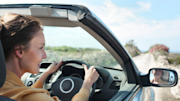What is car insurance excess?
Busting the driving myths

From a ban on flip flops to strict rules on what you can eat and drink in the car, there are plenty of myths around what will land you in trouble when you’re behind the wheel.
Sorting the facts from the fiction will help you stay the right side of the law. So, here are 5 of the common myths and what the law actually says.
You can’t drive in flip flops
While you won’t automatically get a fine, you could land yourself in trouble. Rule 97 of the Highway Code states that before setting off, you should ensure that clothing and footwear do not prevent you from using the controls in the correct manner.
If your flip flops (or any footwear) fall foul of this, stay safe and legal by swapping them for something more suitable.
You must always carry your driving licence
This one’s almost ingrained in most drivers, yet it’s another myth. A police officer can ask to see your licence at any time, but if you haven’t got it then you’ll have 7 days to produce it at a police station.
The same is true for your insurance and MOT certificates.
You mustn’t eat or drink while you drive
Another myth, though one that’s probably worth remembering when you feel the urge for a snack behind the wheel. While you can have something to eat or drink when you’re driving, make sure it’s not a distraction.
Tucking into a well-laden burger might be exactly what you fancy, but if it means your attention drifts from the road, this could be dangerous and lead to a £100 fine plus points for careless driving.
You can break the speed limit by 10%
You can, but it might not stop you getting a speeding ticket. There’s guidance that says police forces shouldn’t prosecute unless a driver exceeds the speed limit by 10% plus 2mph, though it’s not law.
Even if you get caught within this margin, you could still find yourself with a £100 fine and 3 points plus the prospect of higher insurance premiums.
You can avoid speeding fines with a dirty number plate
This one is definitely best avoided. Yes, a speed camera may struggle to read your car’s registration number if it’s grubby or difficult to read. But if the police clock you driving around with a dirty or illegible plate, you could end up with a fine of up to £1,000.
There's plenty to consider when getting behind the wheel, so why not read our article on the benefits of being a safer driver.
We can also help protect you on the road. Visit our car insurance page to find out more and get a quote for your vehicle.
Exclusive offers for Co-op Members

Car insurance
Exclusive member price on car insurance.
Your discount is applied if your details match those on our membership database and is not available on add ons.





